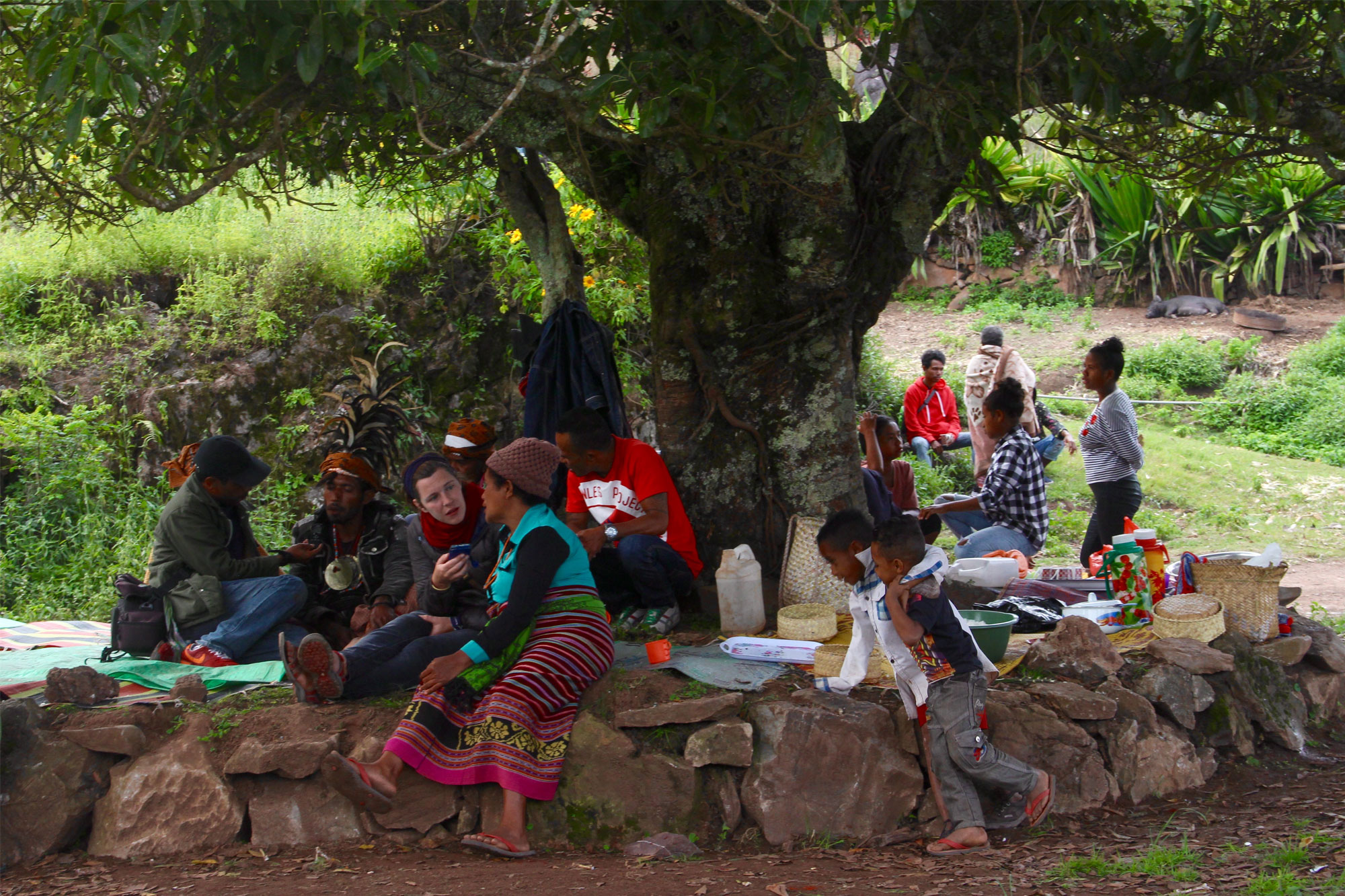Laura Burke is a Social Anthropology PhD student currently carrying out research in Timor-Leste. She has recently been collaborating with a local radio station to communicate her findings to the community she has been working with. She writes:
“Laura, use the flash,” Augusto whispered. We were in a dark, crowded room where a ceremony celebrating the end of this year’s water festivals was taking place. Elder representatives of four sacred houses were sat on four separate, woven mats sharing piles of rice mixed with corn and boiled chicken. I joined Joaquim and Augusto, from the local radio station, and a number of other people running around taking pictures. We looked for the best angles whilst trying to stay out of each other’s shots. Augusto paused for a moment to fix the flash on my Canon. My camera’s flash charged up, buzzed and joined the other flashes lighting up the dark every few seconds. The participants of the ceremony were unphased. They posed and smiled from where they sat, dressed in feathered headdresses (manu fulun) and carrying swords (surik). On a fifth mat sat a member of government. “Do you want to interview him?” asked Joaquim, head of the local radio station. I took him up on the offer of an introduction to the Secretary of State and we went outside for a quick interview before he left. I quickly explained my research and asked a few short questions to get his thoughts on the ceremony both for my research and the local radio. Afterwards, I handed a dictaphone back to Joaquim and we went back inside. We had been at the ceremony for over seven hours and there was still more dancing and speeches to come.
Timor-Leste is the newest nation in Asia and became independent in 2002 after a 24 year occupation by Indonesia. Timor-Leste has experienced a post-war population boom and 70% of its population is under 35 years old. This makes it one of the youngest nations in the world. In a country often characterised by its history of conflict, I have been exploring ideas about ‘reproduction’ and the next generation. I have investigated issues of reproductive rights, health care, education and cultural practices to understand how people are preparing and thinking about life in the future.
My fieldwork takes place in the central mountain town of Maubisse: located in a sub-district with the highest birth rate in the country. Here, I have had the opportunity to follow the activities of local healthcare programmes which tackle bad roads to bring basic medicines to communities high up in the mountains. My research also involves following cultural festivals like the one described above. Most recently was Du Era, a group of festivals which bring clan houses (uma lulik) together to celebrate the water sources which give life to the crops and the people that eat them. It is a celebration of the continuation of nature’s resources and the life they sustain.
Working alongside the local radio station, Radio Komunidade Maubisse Mau-Loko, I have been able to gather more information and see how they work. As the main source of information for the community, I am collaborating with them to share some preliminary research results with the community, and get local feedback and comments that will contribute to my final thesis.
The radio station is a source of information that is transmitted to the surrounding areas carrying messages about community activities, meetings and announcements as well as playing local music, radio dramas, holding discussions and interviews. Head of the radio station, Joaquim de Fatima Coutinho, described the radio’s activities:
“The most import function of the community radio is to share information with the community, especially about education, health, economy and agriculture, and it also has a role to play in sharing information about the tourism sector and culture. Most of the population in Maubisse are farmers that still strongly follow our culture. So we often put programmes and information on the radio about culture and agriculture. The radio’s work also has a link to health and economy because Timor-Leste, as you know, is a new nation and we need good quality human resources. If any nation or society is to move forward, we need good education and then, if education is going to be key for development, health is also important. So our role is to share good information that is positive and can counsel the community about culture, education, economy and also contributes to the development of Timor-Leste, especially in Maubisse.”
During my research, making small collaborations with community organisations has been not only great fun, but useful to learn about how people are thinking about shaping the future.
Image: Joaquim, head of the community radio station, and Laura Burke conducting interviews at the ‘ai hun’, a place where thanks is given to ancestors and nature during traditional ceremonies (Photo credit: Radio Komunidade Maubisse Mau-Loko).

